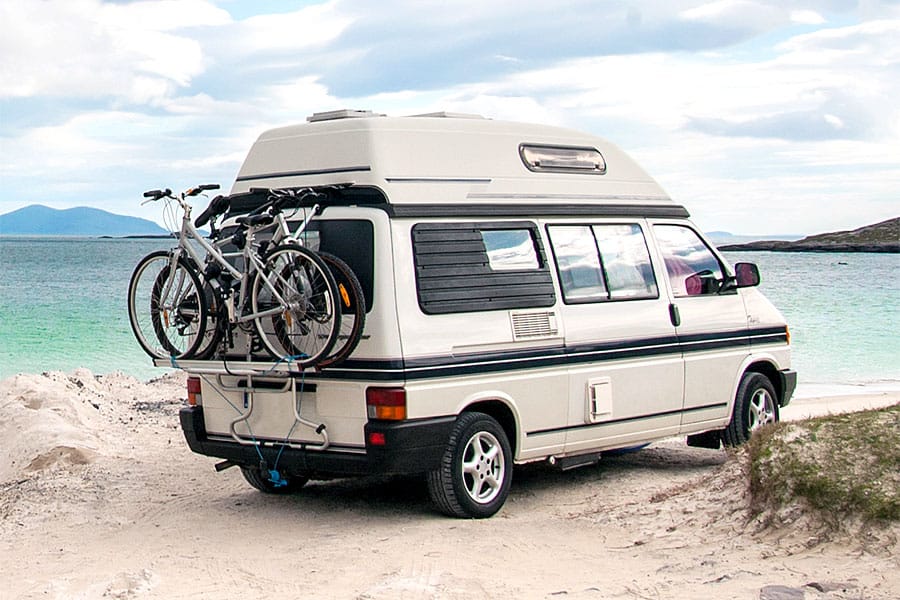
Camper vans have been around for decades. The convenience and excitement of mobile camping are undeniable, but sometimes it can get a bit pricey. If you feel like you’re in over your head, there are plenty of tips to lower the cost and get the camper van that you want.
So, are camper vans expensive to run? Expenses depend on the make, model, and year of the vehicle. Another significant factor is how it’s driven and how often it’s repaired and maintained. Small issues can turn into large bills at a mechanic’s shop if you don’t stay on top of everything.
Throughout this article, you’ll learn the following:
- The price of owning a camper van
- Insurance advice
- Resale value tips
- New vs. used suggestions
- How to make it last longer
The Cost Of Owning A Camper Van
Owning a camper van can cost very little, but it can also cost a lot. The most important part of the process is to try to get a vehicle that’s in good shape. Buying a camper van that’s of poor quality can cost you much more than a newer one would’ve in the first place.
The three most expensive areas of owning a camper van are:
- Maintenance and repairs
- Renovations
- Gas expenses
Maintenance and Repairs
Maintenance entails small routine checkups, fluid changes, tire rotations or replacement, cracks in windows, and more. Just like any other vehicle, camper vans need regular repairs to ensure that they don’t fall apart too soon.
The fluids that have to be changed are oil, transmission fluid, coolant, fill the windshield wiper fluid, and a few others (not including gasoline). You can save some of the money by learning how to change all of these fluids by yourself. However, they don’t cost too much to have a professional do it for you.
Oil should be changed every 6,000 miles or once a year, whichever comes first. The transmission fluid should be replaced every 45,000 miles. Coolant for the radiator should be changed every 45,000 miles as well.
Finally, windshield wiper fluid only needs to be refilled as it runs out. All of these replacements usually cost about $30 to $250 each, depending on the service shop.
Renovations
If you’re buying an old camper van, renovations are bound to be part of the expenses. Whether you’re ripping out the plumbing, making any necessary wiring improvements, or installing a new set of solar panels, there’s always more to do.
The cost of renovations can range dramatically. A simple solar setup can be as cheap as $1,000 or as expensive as $10,000. Replacing a roof vent van will run about $200 to $300, and ripping out a couch and replacing with a new one will be about $500. You can save more money by buying used parts, although it might be a bit challenging to find a camper van couch for sale.
Plumbing repairs are more of an annoyance than a hefty bill. A small clog can run about $10 or less if you know what to do to fix it. The PVC pipe isn’t expensive at all, nor is the glue that you need to connect it together. The only problem would be if you had to replace an entire water tank, or worse, the water pump.
Water pumps for camper vans are about $75 to $200, depending on the size that you need to buy. If you can DIY the project, then you don’t have to worry about the $100+ price tag that camper van repair shops will charge you.
Other renovations that you can do on a camper van include cabinetry, new seating arrangements, mattresses, countertops, TVs, stereos, speaker systems, coffee machines, stovetops, ovens, and more.
Remember that most items found in a camper van are exclusive to the vehicle, meaning that you can’t replace them with a standard couch, counter, cabinet, etc.
Gas Expenses
The problem with calculating gas expenses is that they depend on the price of gas at the station you go to, the size of your camper van’s tank, it’s fuel-efficiency rating, and how often you drive. Using those four variables, we can narrow down the price. I’ll explain this using an example of a current model.
The 2020 Winnebago Travato 59G is a popular camper van. It has a fuel economy of 18 to 22 miles per gallon, and the tank is big enough to hold 24 gallons of gasoline. With a national average of about $3.00 per gallon of gas, let’s use the 22-gallon highway rating to break it down below.
A full gas tank would cost you about $72, and you’d be able to drive for up to 528 miles.
Here are the estimated costs for gas (to and from) for camping and traveling trips for the 2020 Winnebago Travato camper van:
- 100 miles: $13 to $14
- 200 miles: $26 to $28
- 500 miles: $65 to $70
- 2,000 miles: $260 to $280
Keep in mind that most camper vans that are over a decade old get a fuel economy that’s half as efficient, which means these prices could be double. Also, gasoline might be cheaper or more expensive in your area.
Again, there are too many factors to pinpoint an exact number, which is why you should lay out a budget beforehand. Don’t forget about inner-city travel, campground driving, and detours.
We have a couple of other related posts that might be of interest to you “Should I Buy Or Rent A Van Camper?” and “What Should You Know Before Purchasing A Class B Motorhome?“
Are Camper Vans Cheaper To Insure?
Camper vans are almost always cheaper to insure because they’re in use less often, they’re not driven as many miles, and they’re rarely used as commercial vehicles. After all, companies usually look for empty cargo vans rather than camper vans with couches, sinks, and mattresses.
Camper vans have their own classification with insurers. They’re almost always going to have lower rates, which is a huge benefit for camper van owners. Camper vans get better insurance plans in general, because owners only drive them on average, 5 to 6 thousand miles per year.
Also, camper vans are generally cheaper to insure than most other vehicles. If you make your conversion van from a passenger or cargo vehicle, you might be able to qualify for a lower payment as well.
Usually, your homeowner’s insurance will cover any personal belongings contained in the van since they act as a home on wheels for short periods.
Remember that it’s illegal not to insure any vehicle, including camper vans and motorhomes. Luckily, you can spend under $60 per month to protect your camper van safely.
Are Camper Vans Cheaper To Tax?
Camper vans are taxed one way or another. The question is whether or not it’s cheaper than a regular vehicle. There are three variables to consider when it comes to a camper van and motorhome taxes:
- Cross-state taxes
- Domicile taxes
- Trade-in taxes
Cross-state taxes apply when someone buys a vehicle in a state that they don’t live in. For example, some states don’t have sales taxes. If you leave your state to go there to get a camper van without sales taxes, you might be subject to cross-state taxes. However, there are a few regulations that allow you to get around them. Every state has its own rules.
Domicile taxes only apply if you live in your vehicle full-time. Most people are required to claim the state that they live in for census purposes. When you do this, you’re paying taxes on a house, or in this case, a camper van. Again, the state that you live in dictates whether or not you’ll have to pay these taxes.
Finally, trade-in taxes apply when you’re trading in a vehicle for another. Some dealerships will do what’s known as double-dipping. Double-dipping is the act of charging taxes for the traded vehicle and the new vehicle together. It’s illegal in some states, but it’s something to be aware of before you trade a vehicle to buy a camper van.
Unfortunately, taxes are inevitable. However, they don’t make much of a difference compared to the total of your vehicle’s price tag. If you can pay it off quicker, or in one lump-sum right away, then you can avoid high-interest rates. Being able to save 2% to 17% by paying it off earlier is a huge deal.
While it might seem worthwhile to travel to a different state just to buy a new camper van, remember the taxes will follow you no matter what. Instead of wasting the fuel to drive hundreds of miles, why not stay at home and save time and money? You’ll be thankful that you did.
Other Posts of Interest
• How To Convert A Transit Van Into A Camper: The Ultimate Guide
• Why We Bought A Yeti Cooler
• Do Camper Vans Get Stolen? A Guide To Preventing Theft
What Factors Influence The Cost Of A Camper Van’s Upkeep?
The cost of a camper van can be affected by all sorts of factors. As you probably read earlier in the post, fuel economy, maintenance, and renovations are all different expenses. However, they all change based on even more variables, including:
- Age
- Make and model
- Weight
- Driving style
- Mileage
- Where you drive
The age of any vehicle will directly affect how much it costs to maintain. For example, you would probably expect a 30-year old camper van to need some expensive upkeep. The engine might need repairs, there might be leaks through the roof, and the tires are probably worn down. Even if it sat in the same spot for a long time, rust and lack of use destroy vehicles quickly.
The make and model of a camper van determines a few things, but longevity and price are up for debate. Some people love certain brands more than others, which should come as no surprise. However, it’s better to choose a company that’s been in business awhile, rather than one that’s bankrupt or brand-new. Old parts are hard to find; therefore, they’re expensive.
The weight of any van, truck, camper van, or motorhome will change the price to maintain it. The most noteworthy specification to look for is how much it can haul. You should do your best never to exceed the gross vehicle weight rating. Suspension systems, tires, and many other parts of the vehicle can wear down early, costing you more than you should have to spend.
The way that you drive is also important. We’ve all seen those drivers who love to accelerate as fast as possible, only to slam on the brakes every ten seconds when they can’t pass the person in front of them. Gradual acceleration and feather-like braking are both crucial if you want to spend less money on unnecessary repairs.
Mileage is another apparent issue. New vehicles that have under 50,000 miles don’t need very many repairs. On the other hand, a used camper van with 200,000 miles is going to need some work to maintain it. Water pumps, radiators, transmissions, belts, hoses, and plenty of other parts start to break down after the first 100,000 miles on almost any camper van.
Finally, wherever you go, keep an eye out for the terrain. Camper vans come with wheels designed for roads, but you can buy tires made for snow and dirt. The problem is when you start to drive on gravel, sand, sharp objects, and so on. Rubber tires will never do well when they’re stabbed or prodded with rocks. Follow the smoothest path possible.
Resale Value
Selling a camper van is typically a little bit more challenging than getting rid of a car, truck, or passenger van. People need to use regular vehicles for commuting, but camper vans are only used for niche travel and camping. Unfortunately, this means that you might have to wait for a couple of months to sell it.
The good news is that camper vans hold their value longer, aside from the initial loss of value when you drive it off of the dealership’s lot. There’s no reason why you couldn’t sell a camper van for up to 80% of its brand-new price tag if it’s under 20,000 miles.
Nonetheless, the value drops as each year goes by, and it cuts down even more for every 10,000 miles that you tack onto the odometer. A camper van with 50,000 miles that’s newer could sell for $25,000, whereas the same camper with 100,000 miles would only go for about $9,000.
Flipping the stats, an old camper with 50,000 to 100,000 miles would only sell for about $4,000 to $10,000 at best. ‘Old,’ of course, refers to a camper van that’s over a decade beyond the date of manufacture. ‘New’ camper vans are usually less than ten years old.
The make and model also affect how much you’ll be able to sell it for.
As long as you maintain your camper van, hold onto the maintenance records, perform regular maintenance, and drive responsibly, you shouldn’t have a problem getting a chunk of money back.
Here’s a quick secret: If you want a like-new camper van, buy one that’s about three years old. All of the startup maintenance will have already been done, the depreciation value is reduced before you buy it, and you’ll get a better purchase-to-resell value.
The two most significant advantages of buying a brand-new camper van are that you get a fresh, zero-mileage vehicle, and you can customize it through individual companies.
If you’re not comfortable with installing solar panels, TVs, and other amenities by yourself, then you can have them pre-installed before you ever set foot into the vehicle. The downside is that you have to spend more money because you requested customizations. However, more brand-new renovations mean a higher resale value, so it all works out in the end.
If you want to install solar panels yourself and want to avoid the time-consuming process of assembling all the individual components, check out this user-friendly solar kit.
Conclusion
Whether you’re worried about insurance, maintenance, or resale value, camper vans are very affordable, in most cases. There’s a new or used vehicle for everyone.
Here are a few takeaways from the post:
- Maintenance, gas prices, and renovations are the most significant expenses of owning a camper van
- Age, weight, driving style, and many other factors affect the expenses mentioned above
- Camper vans have lower insurance rates because they’re not used as often as regular commuting vehicles
- Try to buy a camper van that’s within 3 to 5 years old to avoid depreciation and big repair bills
- The taxes on a camper van include cross-state, domicile, and trade-in taxes
- Always calculate the mileage of a trip (and add 10% to 15% for detours) to set a gas budget
- Newer vans have a better fuel economy than old ones
- Use the correct tires for the terrain that you’ll be driving on to prevent them from wearing down
- Renovations aren’t necessary, but they help to raise the resale value of a camper van several years down the line if you choose to trade or sell the vehicle





